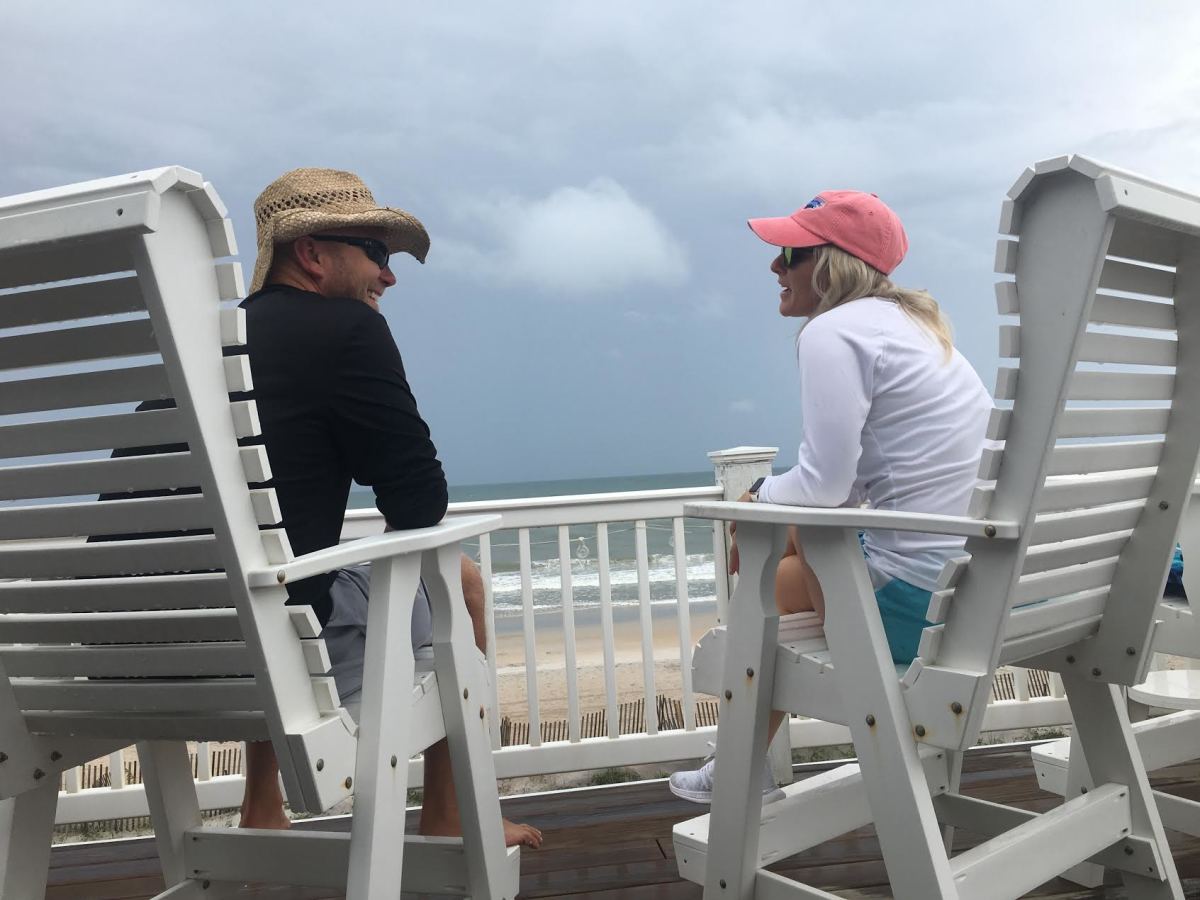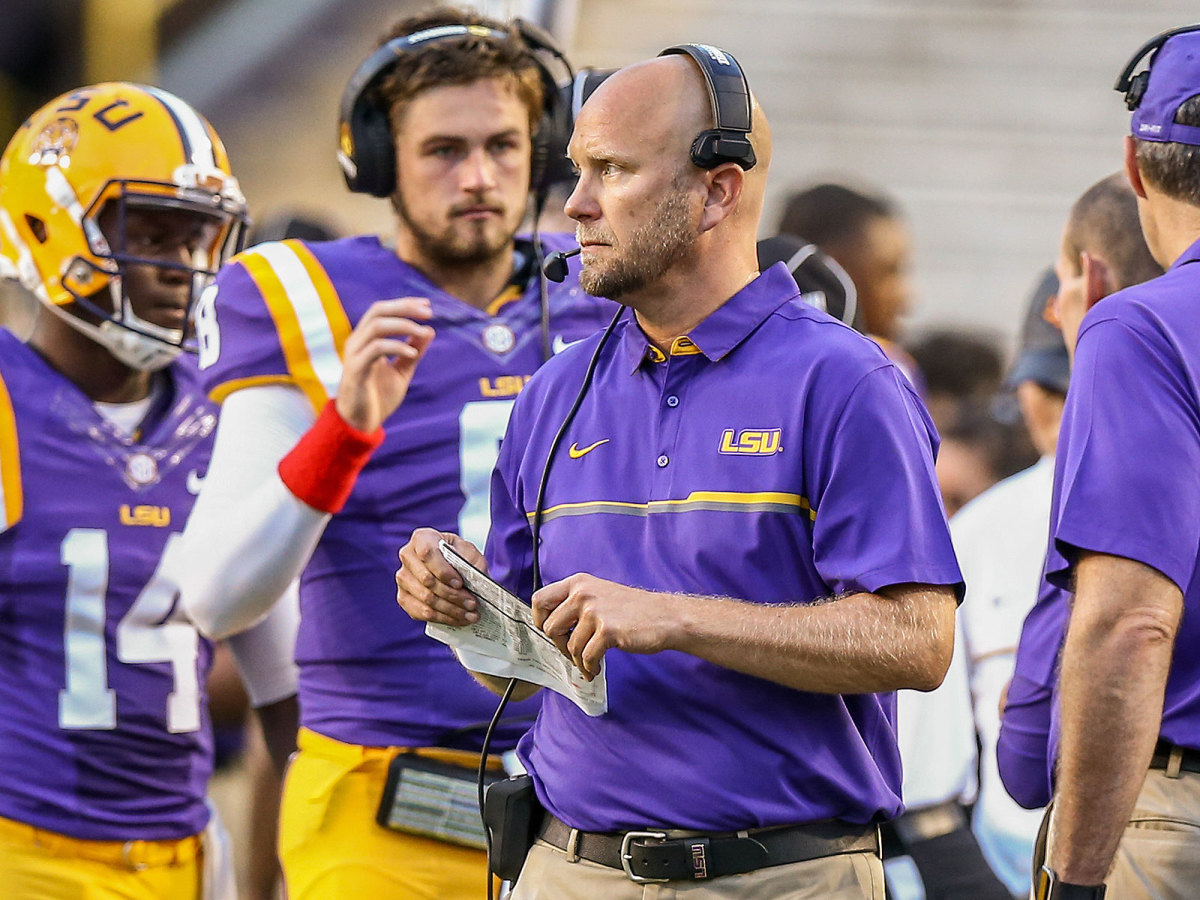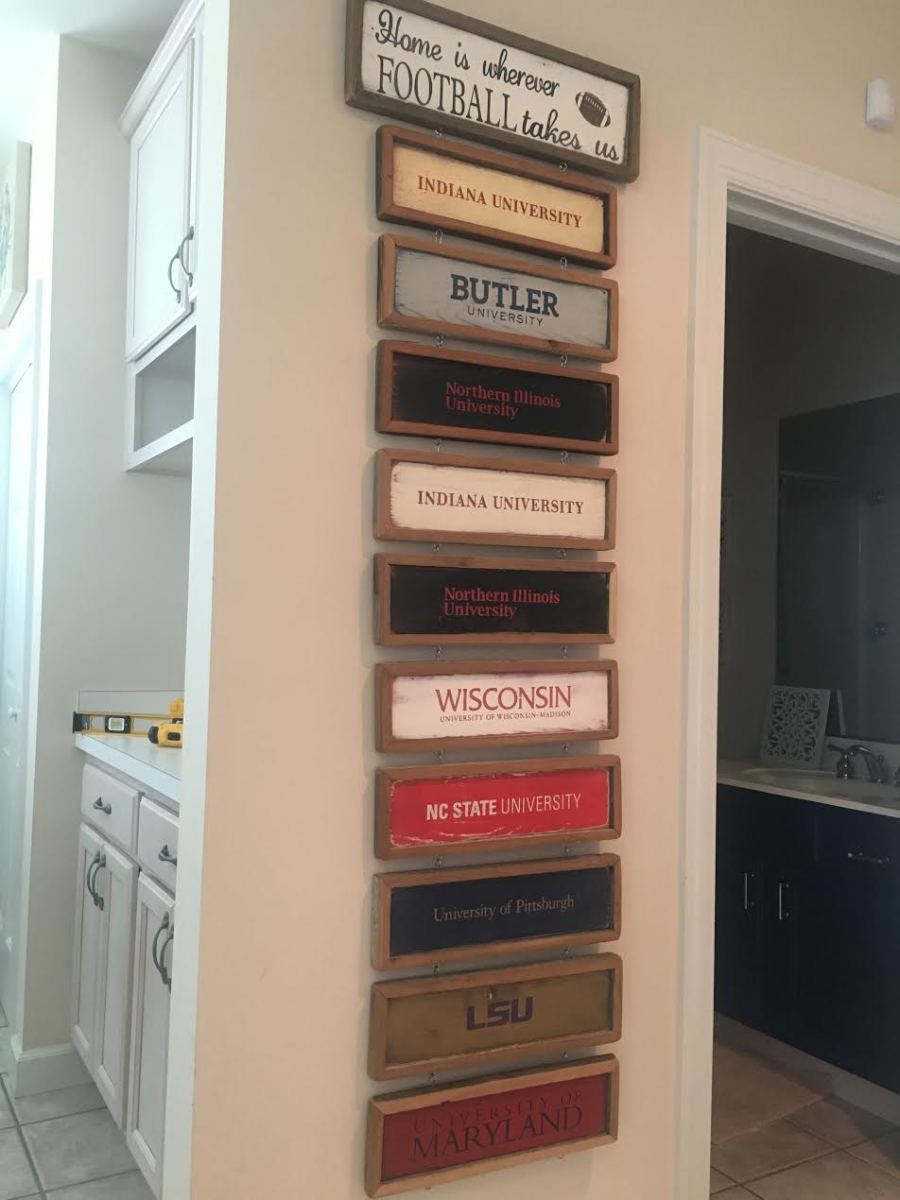Where in the World Is Matt Canada—and Why Doesn't He Have a Job?

NORTH TOPSAIL BEACH, N.C. — “APB... Amber Alert,” the tweet says, “where is Matt Canada?” Earlier this month, a friend sent Canada a screengrab of that message posted on the social media site, and on this rainy August day, it makes him chuckle. The tweet’s author is no one Canada knows. It belongs to that of a casual college football fan curious about the whereabouts of a college football coach who had ascended to the top of his profession and then, without a trace or goodbye, disappeared into the ether. The tweet wonders aloud what many of us have asked internally at some point this offseason: Where is Matt Canada?
On this particular day, Matt Canada is nestled within a charming beach house located in a sleepy seaside town situated on an isolated island where the Atlantic Ocean meets the eastern shore of North Carolina. It is August, and that usually means he’s preparing a team for the football season, but instead Canada is dressed in what he calls his new daily uniform, an ensemble reserved for Florida retirees and, apparently, unemployed coaches: sandals, shorts, a long-sleeved dry-fit shirt and an Aussie-style, straw cowboy hat. He slips off his shoes, because they are optional here (his backyard is, after all, quite literally the beach), and he reclines in a white high-top Adirondack chair while being serenaded by nature’s No. 1, smash-hit single: waves crashing ashore (so close that at 47-years-old even he can find the water with a football).

Yes, on the opening week of the 2019 college football season, a man who was recognized just three years ago as one of the top assistants in football, a guy who only two years ago was the highest paid offensive coordinator in the sport, a coach who last year led Maryland to the brink of bowl eligibility despite the darkest of days, is at the beach. “It’s been great to be off the grid,” says Canada, “but it’s odd this time of year to not be with a team. The ups and downs of our business… well, I’ve certainly had a few.” Many of Canada’s colleagues are shocked he doesn’t have a job, and his former players are surprised, too, stunned that schools passed on a man they believe possesses one of the more brilliant offensive minds in the game. Canada himself admits to passing on at least a couple of coordinator opportunities this offseason. All of this means that the college football world is left with a void. For at least one season, the sport is without a unique offensive scheme that manipulates defenses with movement by way of incessant presnap motions and shifts. It is a system anchored around the fly sweep, and adorned with reverses to left tackles and shovel passes to tight ends, one with fluctuating pace, loads of misdirection and an inverted triple option that confounds some of the game’s most savvy defensive gurus.
Canada’s concepts are compelling enough that they’ve crept into the NFL, with Chiefs coach Andy Reid incorporating them two years ago, followed by the Seahawks, Bears and Rams. “We’ll see people doing stuff and we’ll go, ‘Man, remember when we did that seven, eight years ago?’” says Eddie Faulkner, an assistant for the Steelers who spent five years under Canada at three different schools. “He doesn’t get the credit he deserves for what he’s brought to offensive football.” Canada’s units set offensive school records at Indiana (2007), Wisconsin (2012) and Pitt (2016), and most recently, as interim coach during a drama-filled season at Maryland, his offense hung a combined 85 points on Texas and Ohio State.
Those in the industry see his worth. Canada spent all of last week performing a comprehensive analysis of personnel and scheme for an NFL franchise at the request of its upper management. He declines to divulge the franchise’s name. That trip followed several visits he made to Power 5 camps, where he guided schools in integrating portions of his offense. This summer, he’s turned down a handful of analyst jobs with major colleges and full-time consultant positions at the pro level. So maybe the question is not where is Matt Canada, but why is Matt Canada unemployed? “‘He’s tough to work with’ is the perception,” says Booger McFarland, the former NFL and LSU defensive lineman who’s the color analyst on Monday Night Football broadcasts and has deep ties in the college game. “It’s been a stigma that’s followed him. People talk in the business. I’m just assuming that’s why he doesn’t have a job.”
During a three-hour long interview at his beach house, Canada addresses the last half-decade of his career, a figurative roller coaster ride that included four schools, three firings, two multi-million dollar contracts and the death of a player. He opens up, as much as he can, on the drama-filled stretch and defends his reputation. “I don’t know what or how exactly it’s out there that I’m hard to work with,” Canada says. “At two places there were head coaches who wanted to go in a different direction. It happens all the time in this profession.” Those were NC State in 2015 and LSU in 2017, the latter of which resulted in a $1.7 million settlement that included a non-disclosure agreement, a sign of unrest behind the scenes in his one year in Baton Rouge. Because of the agreement, Canada is limited in discussing his time at LSU. He side steps or declines to answer questions about he and LSU coach Ed Orgeron, an infamous icy relationship rooted in Orgeron’s mid-season intervening in the offense. LSU officials are also bound to silence because of the non-disclosure. “I respected Coach O’s decision to handle it like he did,” Canada says. “He didn’t feel that it was best for his program for me to be the playcaller. I learned a tremendous amount from Coach O.”

Canada was blindsided by NC State’s decision to fire him in 2015, especially following a season in which the Wolfpack averaged more points a game than all but two teams in program history. One morning, he and NC State coach Dave Doeren were collaborating on potential offensive staff moves for 2016, and that afternoon, Doeren called to deliver the news. “They,” he told Canada, “have decided to make a change.” A year later at Pitt, he became one of the hottest coordinators in college football after turning the Panthers into a top-10 scoring offense, fielding serious interest from UCLA and Notre Dame before accepting a $1.5 million salary in Baton Rouge. It was a raise of more than 400%. “What coach wouldn’t have left for that?” says Erin Canada, Matt’s wife of two years.
The Canadas bought a house in Baton Rouge. They had a pool installed in the backyard, along with fully-grown trees. “We thought we were going to be at LSU for a few years,” says Erin, a fellow Midwestern who Matt met in 2015. The two married in May of 2017 right here, on this 26-mile remote island about 45 minutes north of Wilmington. Attending the wedding was at least one member from each of the 25 college staffs on which Canada served, proving it by showing a reporter photos from the ceremony. “ For somebody hard to work with,” Canada smirks, “that’s a lot of people.”
North Topsail Beach is a vacation community of less than 1,000 residents occupying the top half of Topsail Island. The island is known for its maritime forests and its sanctuary for sea turtles, a quiet escape for those who prefer to vacation away from the bright lights of the Outer Banks to the north and Myrtle Beach to the south. Four years ago, Matt Canada purchased this 2,300-square foot, four-bedroom beach house. The Canadas own two more homes in their cul-de-sac, along with a commercial rental property across the bridge on the mainland. Their favorite restaurant, Rick’s, is across the bridge as well. In fact, on a recent Thursday night, the Canadas enter this Pittsburgh Steelers-themed eatery to a loud greeting from a gaggle of older women seated at the bar. The Canadas are local celebrities here. Later that night, a man by the name of Pete politely interrupts dinner, shakes hands with everyone at the Canadas’ booth and looks toward Matt. “So,” he says, “when you getting a job?”
Canada is preparing for that day, and he’s not ruling out coaching this year. Things can change quickly in the profession. While the silly season in college football is long over, NFL teams often add staff as late as September. For now, he spends at least two hours each morning watching game film while jogging on a treadmill. “I’m having the chance to see what everybody else is doing,” he says. “You try to find better ways to do things.” During a 25-year coaching career, nothing taught him more than his 115 days as interim coach at Maryland. He replaced the suspended DJ Durkin, who was eventually fired over the death of Jordan McNair, a victim of heatstroke suffered during a team workout. Canada was a rookie in the head coach’s seat having to rally a heartbroken team in a divisive situation. He was praised nationally for leading the Terrapins to five wins. They beat Texas 34–29, trounced Minnesota by 29 points and put up 63 against Illinois. He realized something: “I want to be a head coach,” he says. This past offseason, industry sources tell Sports Illustrated that four programs interviewed Canada face-to-face: Appalachian State, Utah State and Maryland for head coach openings, and Tennessee for its offensive coordinator job. Canada declines to confirm any of this. “Somebody needs to give him a shot,” Faulkner says. “I hear the same thing—he’s a hard guy to work for. That couldn’t be anything further from the truth.”
For Canada, McNair’s death was a reminder of the fragility of life, something he’ll remember forever. On the field, one play of that season still stings: his decision to attempt a potential game-winning two-point conversion in a 52–51 overtime loss to Ohio State. “That’s the one,” Canada says. “It sticks in my head more than others.” He called a run-pass-option play, with a potential shovel pass inside, and a rub route to the three-receiver side. The play worked perfectly. The rub, or pick, produced an open receiver a yard deep in the end zone. Quarterback Tyrell Pigrome threw wide, the ball hit the turf and Maryland lost. Three weeks later, the Terps hired D.C. native Mike Locksley. If that pass is complete, does Canada get the full-time job? “I never thought I was going to get that job,” says Canada, one of three candidates who Maryland officials interviewed in-person, joining Locksley and then-Michigan pass game coordinator Pep Hamilton. “I think they made a great decision. Locks is from the area. He wanted the job. It’s what I thought would happen. They wanted a fresh start and all that.”
Several of Canada’s former players spoke to SI for this story, openly discussing their ex-coordinator. “We all enjoyed playing for him,” says former LSU center Will Clapp, now a lineman with the Saints. “I would have thought he’d have a job. His offenses have always been good. What happened at LSU… that kind of… he has this perception of being hard to work with. I never thought as a player that he was difficult to work with.” Tre Watson, now with the Dolphins, was a linebacker at Maryland last season. He says Canada made the best out of an impossible situation. “He was open and honest in a time where we didn’t have a lot of that,” he says. Former LSU guard Garrett Brumfield called Canada “a breath of fresh air” and described his offense as “dummy proof,” hard to defend but easy to learn. “I understand how people could have thought that some of the motions and shifts were smoke and mirrors,” says Brumfield, now with the Steelers, “but I think a good bit of it worked. I thought that offense was only going to get better.”
On his offense, there is little debate among most college football experts: It is intriguing, creative and somewhat revolutionary. “Him being able to create mismatches and find holes in the defense with movement, he’s probably the best I’ve ever seen,” says Cole Cubelic, a former Auburn center who’s now an analyst for ESPN. In his one year in the SEC, Canada says his system “held up.” The 2017 Tigers finished ranked 76th in scoring and 54th in total offense, but they took a more conservative approach, he says, leaning on one of the nation’s best defenses. For a better measuring stick, Clapp points to LSU’s performance that year against Alabama. The Tigers ran for more yards in that single meeting with the Tide (151) than they did in 2015, 2016 and 2018 combined. “First time Alabama couldn’t figure out our offense,” Clapp says. Clemson had trouble too. Longtime defensive coordinator Brent Venables’ defense allowed a combined 84 points in consecutive seasons to two different teams coached by Canada, the latter a 43-spot by Pitt in 2016. No team has scored more points against Clemson since. “I love his offenses,” says Chris Doering, an ex-Florida receiver, radio host and SEC Network analyst. "In terms of creativity, the shifts and motions and eye candy stuff, it puts defenses in a bind. He probably handled a terrible situation at Maryland better than most and then he fell off the face of the Earth.”
Not quite, but this beach town is indeed remote. Canada is seated inside of his beach house now, a living room with vacation themes abound. “Life is better with the ocean,” one decoration reads. Canada has been getting advice from those who have been in this position. He’s spoken to Auburn coach Gene Chizik, ex-Syracuse coach Scott Shafer and others, and they’ve all told him the same message: enjoy the downtime. Don’t worry, he is. Later this month, Canada will attend his first ever partents’ day at the University of South Carolina, where his daughter Tori is a senior. He plans to attend a few Gamecocks’ games, including the season opener against North Carolina in Charlotte, and he’ll also be on hand for games at East Carolina, where his son Chris is a sophomore. All of these are firsts. “There are a lot of things you miss,” he says, “in this profession.”

That goes beyond family. He was introduced this offseason to a thing called Netflix and watched a drama series named Game of Thrones. “I read the spoilers critiquing the finale, and then I watched the finale,” Canada says. “They were all right!” He will soon start piano lessons, and he’s learned not to mix grays and blacks when doing laundry (he no longer does laundry). He visited Italy for 16 days earlier this summer, and he spends most of his Saturdays not pouring over film or visiting recruits, but hosing down the windows and porches of his two vacation rentals. He’s also catching up with old friends. He spoke recently with Ellie Mallory, the wife of Canada’s now-departed mentor Bill, the longtime football coach who passed away in May 2018. An Indiana native, Canada cracked into coaching as a gofer for Bill Mallory’s IU football teams in the early 1990s. Ellie called Canada while rifling through Bill’s old journals, specifically an entry he made in 1979 during his own year away from football. “He used that year off to jump start the second half of his career,” Canada says. “Maybe I can do the same.”
He’s ready to get back at it, feel the bond of camping with a team in August, the accomplishment in implementing his scheme, the rush of calling plays and the reward of a perfect touchdown. Meanwhile, he’ll visit camps, football buildings and even stadiums that he cannot call his own. He’s at least got this—that beach house. Beside the front door of the home, there hangs a decorative piece of art stretching from the floor to the ceiling. At the very top, six words are etched on a wooden backdrop, “Home is wherever football takes us.” Hanging below it are individual pieces of wood fastened to one another through metal hooks, each representing a Canada coaching stop. It is a career ladder, the pieces positioned in chronological order one after another etched with a different college name: Indiana, Butler, Northern Illinois, Indiana, Northern Illinois, Wisconsin, NC State, Pitt, LSU, Maryland and… Canada lowers his eyes to small sliver of space between the Maryland plaque and the floor. “We’re going to need a longer wall.”
